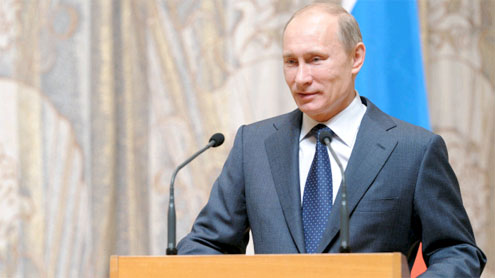 MOSCOW: Prime Minister Vladimir Putin on Wednesday rejected calls to hold talks with opposition leaders who have brought tens of thousands of Russians into the streets to demand an end to his 12-year rule, saying he doesn’t know what the demonstrators want or who he would talk to.
MOSCOW: Prime Minister Vladimir Putin on Wednesday rejected calls to hold talks with opposition leaders who have brought tens of thousands of Russians into the streets to demand an end to his 12-year rule, saying he doesn’t know what the demonstrators want or who he would talk to.
Putin has belittled the opposition even as his government has rolled out a set of proposed reforms in response to outrage over the Dec. 4 election for parliament, in which only Kremlin-approved parties were allowed to run and observers reported widespread vote-rigging. Putin hopes to return to the presidency in a March vote.The opposition leaders “should formulate some kind of common platform and common position, so that it’s possible to understand what people want,” a smiling Putin told a group of Russian reporters. “Is there a common platform? No. Who is there to talk to?”
The organizers of the two vast Moscow rallies this month included many prominent public figures and opposition leaders. Although some differ widely in their political views, they have passed joint resolutions with a list of concrete demands, including a rerun of the parliamentary election, the resignation of the Central Election Commission chief and the removal of barriers that have prevented opposition parties from taking part in elections.The protests, unprecedented in post-Soviet Russia, have undermined Putin’s image as the inevitable winner of the March vote. He previously served as president in 2000-2008.
Putin has promised to ease rules for opposition candidates and make the voting process more transparent, but he has firmly rejected the demand that the parliamentary election be rerun.Putin’s former finance minister, Alexei Kudrin, has offered to help mediate between the opposition and the government. Leaders of the opposition said Wednesday that they welcomed Kudrin’s offer and would present their principles and conditions for talks by the end of the week.
Asked Wednesday about his refusal to take part in campaign debates, Putin said it would make no sense since the opposition leaders are “not burdened with real work” and “always demand the impossible.”His contention is that opposition candidates can promise voters anything, while he as prime minister bears greater responsibility and has to follow through on his promises. He has offered to arrange for “younger brothers,” his subordinates in the government, to take part in the televised debates. – Yahoonews











